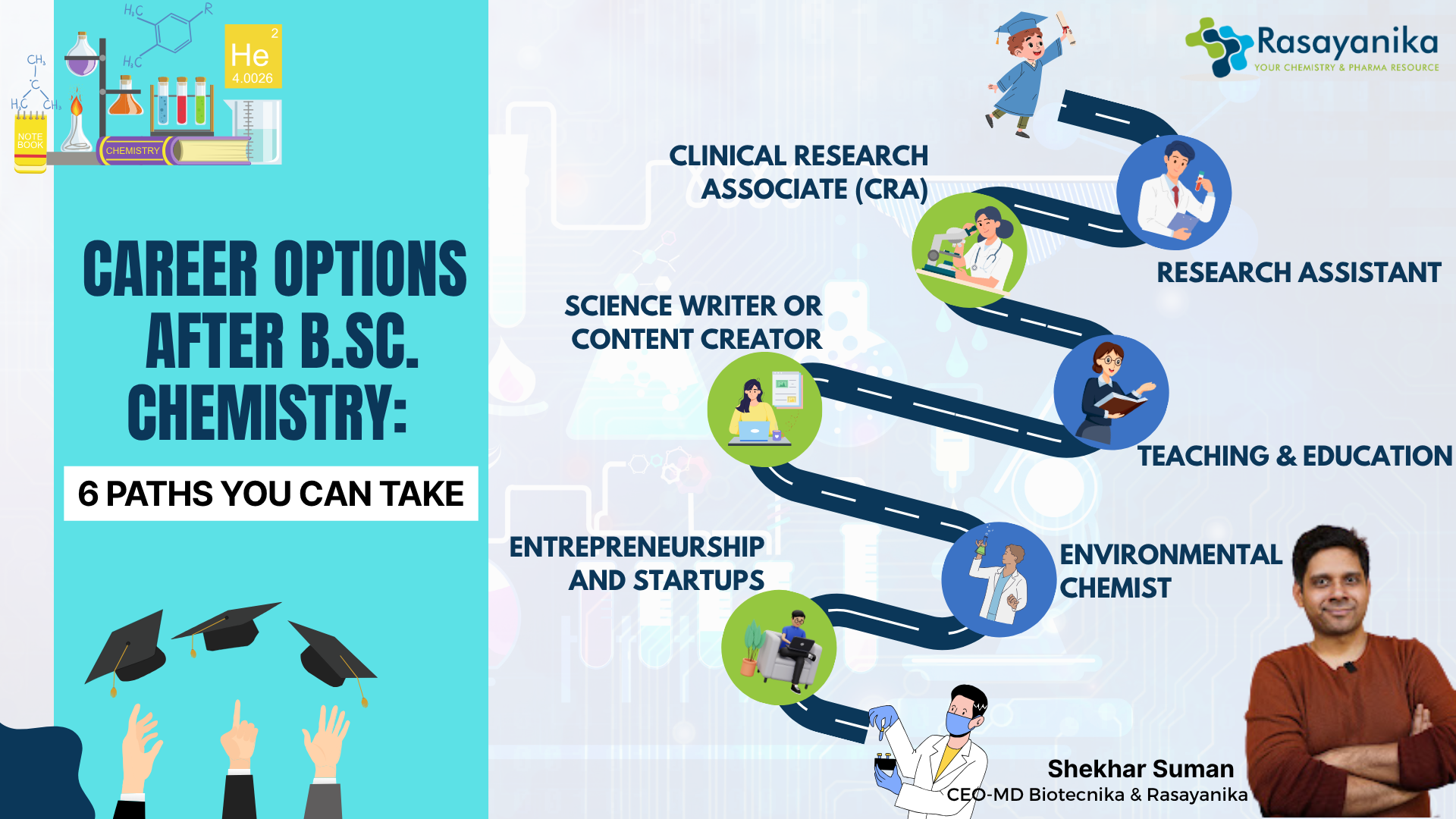Career Options after BSc Chemistry – Top 10 Paths
Bachelor of Science (B.Sc) in Chemistry is more than just a degree, and it’s a gateway to diverse and rewarding career paths. From hands-on lab work and research to roles in education, industry, and even content creation, the possibilities are vast. Whether you’re passionate about scientific discovery, environmental impact, teaching, or starting your venture, chemistry provides a solid foundation to build.
In this article, we’ll explore the top 10 exciting Career Options after BSc Chemistry, the skills required, and how to get started in each field.
- Research Assistant
- Being a Research assistant is a top career option after B.Sc. chemistry, as you will be working in R&D. Chemistry involves hands-on experience with instrumentation.
- As a research chemist, you will help scientists or senior scientists carry out experiments. You will gain experience in data collection, sample analysis, and result interpretation.
- You can work in Laboratories, Research institutions, and Universities as a research assistant or chemist.
Skills Required
- Basic lab techniques
- Data analysis
- Attention to detail
You must be wondering, Where to find this job?
Universities and Academic Institutions like IITs, IISERs, JNU, DU, BHU, etc., have openings for research associate positions. In
these positions, you will be trained under a research guide. They also offer internships, which will boost your laboratory skills.
- Quality Control Analyst
A quality control (QC) analyst tests chemical products to meet quality standards. You’ll work in labs testing raw materials, in-process samples, and finished products using techniques like chromatography, spectroscopy, and titration. This is especially important in the pharmaceutical, food, and cosmetic industries.
Skills Required
- Knowledge of analytical chemistry
- Good Manufacturing Practices (GMP) and Good Clinical Practices (GCP)
- Understanding of regulatory requirements to test whether they meet quality standards.
- Use of instruments like HPLC, UV spectrometer
- Report writing and Maintenance of lab records.
You can boost your skills by pursuing a certification in GMP and GCP Regulatory, which enhances your knowledge of the required theoretical part of pharmaceutical product quality control.
- Clinical Research Associate (CRA)
A CRA monitors clinical trials for new drugs or medical treatments. You will ensure trials follow guidelines and maintain proper documentation.
There are many associated levels in clinical research, as it covers the entire field of clinical trials.
a. Entry-Level: Clinical Trial Assistant (CTA) / Clinical Research Coordinator (CRC): This role mainly supports Clinical Research Associates and their teams by helping them with the documentation process, preparation for clinical trials, and communication with the sites.
b. Associate CRA / Junior CRA: Higher level of CTA/CRC, where you should have previous work experience as a clinical trial assistant, so that you can accompany the team in clinical trial experiments. The primary role of this job is to assist in monitoring clinical trial sites, reviewing source documents, and ensuring protocol compliance.
c. Clinical Research Associate (CRA): Independently monitor clinical trial sites, ensure protocol adherence, manage site communications, and conduct site visits from initiation, monitoring, to closeout of the experiment.
This requires strong knowledge of clinical trial phases, regulatory documentation, travel flexibility, and problem-solving skills. You will work independently in the laboratory, supported by assistants, and be mainly responsible for the entire experiment.
d. Senior CRA: Senior-level CRAs lead complex or high-risk trial sites, mentor junior CRAs, support project management, and liaise between sponsors and sites. As a senior CRA, you will be responsible for the development of the whole team’s success and for supporting and guiding the junior CRAs.
e. Management-Level Roles: This is the highest level in CRA, where you will be managing the entire clinical trial experiment. All clinical research associates work under a manager who leads and manages the entire team.
- Clinical Trial Manager / Project Manager: Oversee clinical trials across multiple sites.
- CRA Line Manager: Manage a team of CRAs, training, and performance evaluation.
- Clinical Operations Manager: Strategic oversight of clinical research operations within an organization.
Skills Required
- Understanding of clinical protocols
- Communication and documentation
- Ethics and regulatory knowledge
Take a course in Clinical Research after your B.Sc. Many hospitals and CROs (Contract Research Organizations) also hire fresh graduates as trainees.
- Environmental Chemist
It involves the study of the effects of chemicals on nature, and is one of the top 10 career options after B.Sc Chemistry. You will experiment with testing soil, water, and air to check pollution levels. You will be analysing pollutants and monitoring contamination levels. Environmental chemists have a significant role in protecting our environment as they study the interaction between chemicals in air, water, and soil to identify the source of pollution. This helps discover solutions for pollution and creates a better and cleaner ecosystem. Environmental chemists ensure safety and monitor waste disposal to reduce the harm to the environment by complying with regulations.
Skills Required:
- Chromatography (GC, HPLC), spectroscopy (ICP-MS, UV-Vis)
- Analytical testing, report writing
- Environmental laws
- Field data collection
Apply to environmental consultancies or NGOs. You can also pursue a Master’s in Environmental Science for better prospects.
- Teaching and Education
Teaching is a great career path if you enjoy explaining concepts and helping others learn. You can work in schools, coaching centers, or online platforms.
Skills Required
- Strong subject knowledge
- Communication skills
- Patience and creativity
Pursue a B.Ed. (Bachelor of Education) After your B.Sc. You can also explore opportunities as an online tutor or content creator in science education.
- Chemist in the Government Sector
Government agencies like ISRO, DRDO, BARC, and public health departments hire chemists. You could be involved in research, testing, or policy development. It is also one of the Top 10 Career Options which provides job security as well.
Skills Required
- Subject expertise
- Competitive exam preparation
- Knowledge of lab protocols
Stay updated with job notifications from UPSC, SSC, and other public sector units. Clearing exams and interviews is key to securing these roles.
- Sales and Marketing in Chemicals and Pharma
The most underestimated career path in Career Options after BSc Chemistry. Chemistry graduates are valued in technical sales, especially for chemicals, lab instruments, and pharma products. You explain products to clients and help solve their problems.
Skills Required
- Knowledge of pharmaceutical products and their uses
- Sales primarily involves communication as the primary skill
- Customer relationship management
Start with a trainee position in sales or marketing. Companies prefer candidates who understand the technical side of their products.
- Science Writer or Content Creator
A scientific writer or content creator is also one of the best career options after a B.Sc. in Chemistry. If you have a passion for writing, it is the best career path for exploring your writing skills. Not only will you gain knowledge on recent trends, but you will also be trained to write about the ongoing news and trends, discoveries, or revolutions so that you can help people understand them better and become aware of them.
Skills Required
- Writing skills
- Ability to explain complex topics simply
- Creativity and research
Start a blog or YouTube channel. Look for internships or freelance projects with publishers, ed-tech companies, or online platforms.

- Further Studies: M.Sc. Chemistry or Allied Fields
Higher studies enhance your practical knowledge and hands-on experience. You will spend most of your time in laboratories, so there are high chances of being exposed to research and development. You will be dealing with huge instrumentation and their data collection, which helps you to pursue your field of interest in chemistry. You can specialize in Organic, Inorganic, Analytical, or Physical Chemistry.
Career Benefits
- Higher pay
- Eligibility for lectureship and Ph.D.
- Entry into specialized roles in industry
Subjects You Can Master:
- Organic Chemistry: Involves working in R&D under the supervision of a guide and the support of PhD scholars. You will get exposure to the synthesis of organic compounds and their effects. Their work is critical in developing new drugs, plastics, dyes, agrochemicals, and fuels. In government roles, organic chemists contribute to quality control, research, and the development of chemical products.
- Inorganic Chemistry: Their expertise is essential in developing materials for electronics, metallurgy, catalysis, nanotechnology, and ceramics. In government sectors, you can contribute to research, material testing, nuclear chemistry, and industrial applications.
- Analytical Chemistry mainly involves the analytics behind the experiments: sample analysis, data interpretation, and Calibration of the experimental study.
- Physical chemistry involves the study of physical principles that underlie chemical interactions. It combines physics and mathematics to help understand reaction mechanisms.
Appear for entrance exams like JAM or university-level tests. You must choose a specialization based on your interest, whether organic or inorganic. If you are good at the analytical study of experiments, then you can select analytical chemistry.
- Entrepreneurship and Startups
This could be one of the top 10 Career Options. You can start your own business in chemical manufacturing, lab services, or educational content. This option is for those who are creative and enjoy taking risks.
Skills Required
- Business planning
- Marketing and sales
- Financial management
Start small with a lab-based service or online platform for better career options after a B.Sc. in Chemistry. Seek guidance from incubators or government schemes for funding and mentorship.
Career Options after BSc Chemistry
After completing your B.Sc. in chemistry, you might be confused about choosing your career path, as it opens the door to multiple opportunities. In chemistry, you will be considered to work in R&D after your undergraduate studies, compared to other courses. It is the beginning of numerous career options after B.Sc Chemistry, such as lab work, research, teaching, writing, and entrepreneurship in chemistry. This guide will help you choose the right career path after your B.Sc. Chemistry. Each path clearly outlines the roles, skills, and qualifications to help you select the field of interest.














































